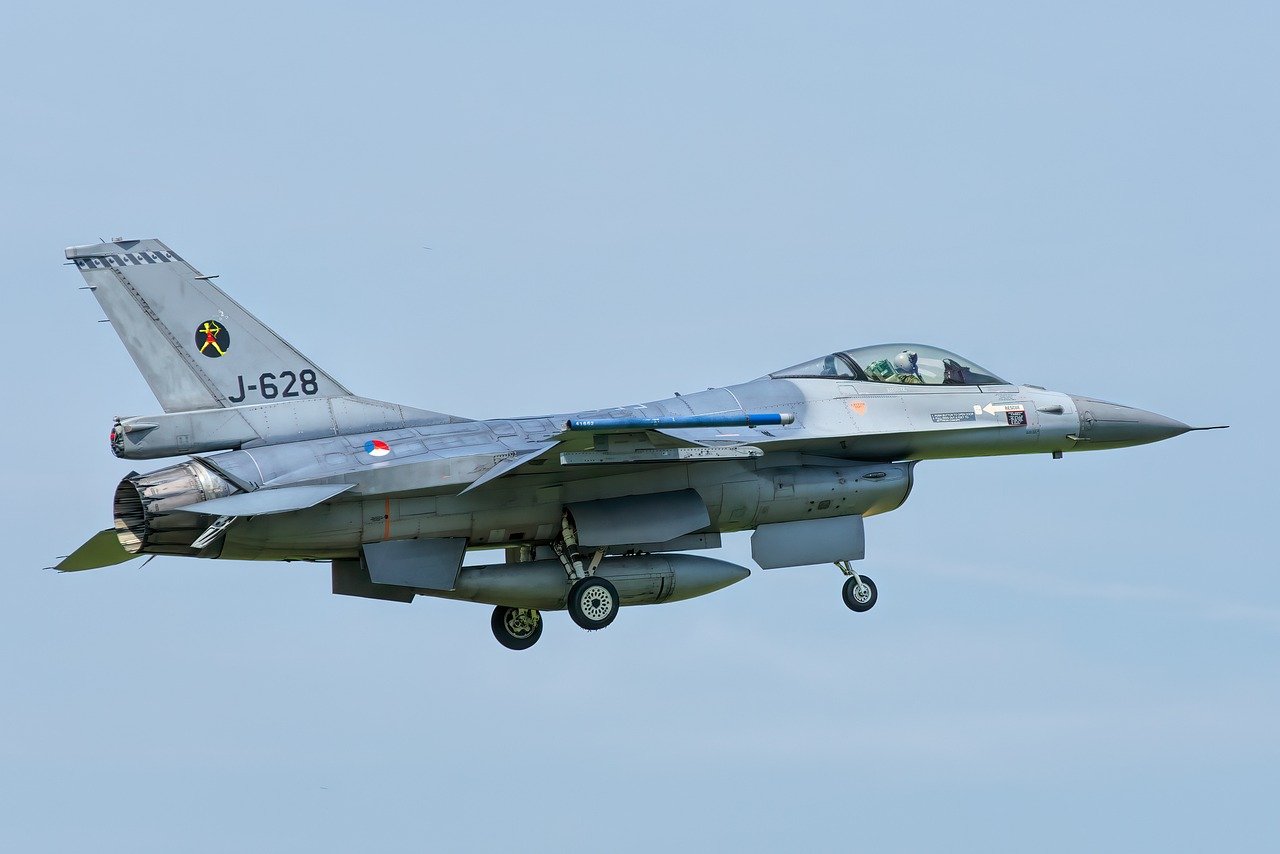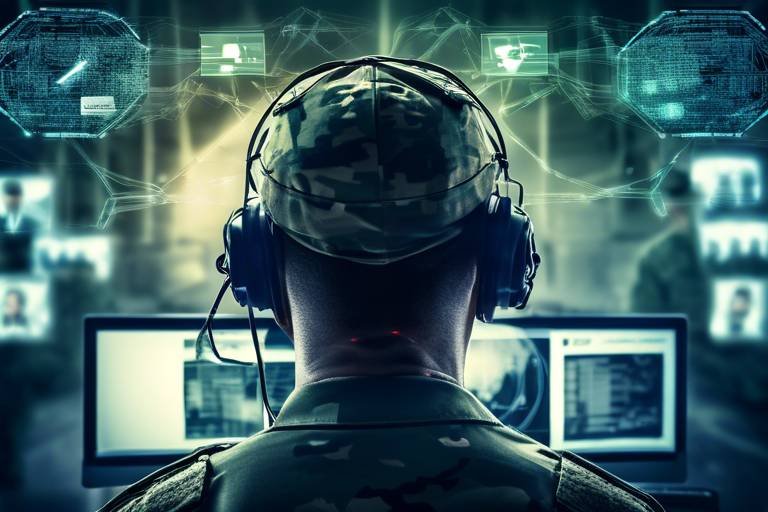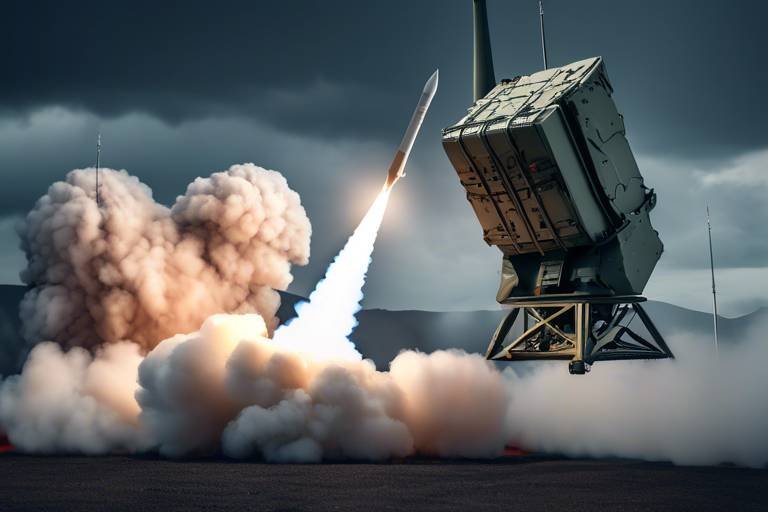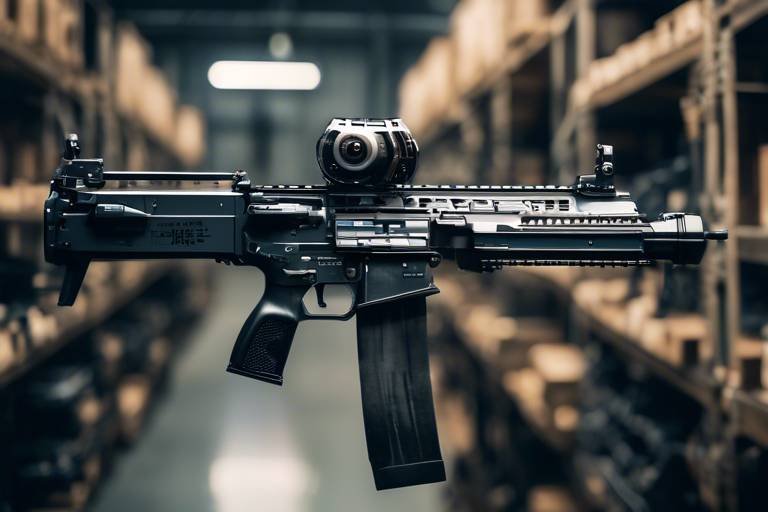Exploring Military Applications of Quantum Computing
As we stand on the brink of a technological revolution, quantum computing is emerging as a game-changer, particularly in the realm of military operations. Imagine a world where our military forces can process data at lightning speed, secure communications with unbreakable codes, and simulate complex battlefield scenarios with unprecedented accuracy. This is not just a futuristic dream; it's becoming a reality thanks to the transformative potential of quantum computing. The implications for security, strategic advantage, and technological advancements are staggering, prompting military organizations worldwide to explore how they can harness this cutting-edge technology.
At the heart of quantum computing are principles that defy traditional logic. Unlike classical computers that use bits as the smallest unit of data, quantum computers utilize qubits. These qubits can exist in multiple states at once due to a phenomenon known as superposition. Coupled with entanglement, where qubits become interconnected in ways that classical bits cannot, quantum computing offers a new realm of possibilities for processing information. This foundational knowledge is crucial for understanding how quantum computing can revolutionize military operations.
One of the most exciting prospects is the potential for enhanced cryptography. In an age where cyber threats loom large, the ability to secure military communications is paramount. Quantum computing can lead to the development of encryption methods that are virtually unbreakable. Imagine a scenario where military communications are shielded from interception, ensuring that sensitive information remains confidential. This is where Quantum Key Distribution (QKD) comes into play, providing a method for two parties to share a secret key securely, even in hostile environments.
Quantum Key Distribution (QKD) harnesses the principles of quantum mechanics to create secure communication channels. By leveraging the unique properties of qubits, QKD allows for the detection of any eavesdropping attempts. If an unauthorized party tries to intercept the key, the system will alert the communicating parties, thereby maintaining the integrity of the communication. This innovation is crucial for military operations where the stakes are incredibly high.
Various military organizations are already implementing QKD to enhance their operational security. For instance, the U.S. Department of Defense has begun testing quantum networks for secure communications. Similarly, countries like China have launched quantum satellites capable of transmitting secure data over vast distances. These real-world applications demonstrate the feasibility and effectiveness of quantum cryptography in safeguarding military communications.
However, it's essential to recognize that quantum cryptography is not without its challenges. The technology is still in its infancy, and there are several technical hurdles to overcome. For instance, the transmission distance of quantum signals is limited, and maintaining the integrity of qubits over long distances remains a significant challenge. Additionally, the cost of implementing quantum technology can be prohibitive for many organizations. Despite these limitations, the potential benefits far outweigh the challenges, making it a worthy pursuit for military applications.
Beyond cryptography, quantum computing holds the promise of vastly improved data analysis capabilities. In military operations, decision-making relies heavily on data interpretation. With traditional computing methods, processing vast amounts of data can be time-consuming and inefficient. Quantum computing, on the other hand, has the potential to analyze complex datasets at unprecedented speeds, leading to more informed decision-making.
Imagine a military strategist equipped with quantum computing tools, able to simulate various scenarios and outcomes in real-time. This capability could drastically enhance operational effectiveness, allowing for swift adjustments based on the latest intelligence. The synergy between quantum computing and artificial intelligence (AI) further amplifies this potential, creating a powerful tool for predictive analytics and autonomous systems.
Simulations and modeling are critical components of military training and strategy development. Quantum computing can facilitate the creation of highly realistic battlefield simulations, allowing military personnel to train in environments that mimic real-world scenarios. This level of realism enhances readiness and adaptability, ensuring that troops are well-prepared for any situation they may encounter.
By utilizing quantum simulations, military organizations can generate complex battlefield scenarios that take into account numerous variables, from troop movements to environmental conditions. This not only improves training outcomes but also aids in strategic planning, enabling commanders to visualize potential outcomes and make data-driven decisions.
Logistics is another area where quantum computing can make a significant impact. The ability to optimize supply chains and resource allocation is crucial for military effectiveness. Quantum algorithms can analyze logistical data to identify inefficiencies and propose solutions, ensuring that resources are deployed where they are most needed.
The integration of quantum computing with artificial intelligence opens new frontiers for military applications. AI-driven decision-making processes can be significantly enhanced by quantum computing, leading to faster and more accurate outcomes. In high-stakes environments where every second counts, this capability could be the difference between success and failure.
With quantum-enhanced AI, military leaders can analyze vast datasets and draw insights that would be impossible with classical computing methods. This could lead to more effective strategies and improved operational outcomes, ensuring that military forces remain one step ahead of adversaries.
Quantum computing also plays a pivotal role in the development of autonomous military systems. These systems can leverage quantum algorithms to improve their operational capabilities, making them more effective in the field. From drones to robotic ground units, the integration of quantum technology could enhance their decision-making abilities and overall performance.
- What is quantum computing? Quantum computing is a type of computing that uses quantum bits (qubits) to perform calculations at speeds unattainable by classical computers.
- How does quantum computing enhance military security? It enhances military security through advanced cryptography methods like Quantum Key Distribution, which ensures secure communication channels.
- What are the current challenges of implementing quantum technology in the military? Current challenges include technical limitations, high costs, and the need for further research and development.
- How can quantum computing improve military decision-making? By processing vast amounts of data quickly and accurately, quantum computing can provide military leaders with timely insights for better decision-making.

Quantum Computing Basics
Quantum computing is a fascinating and rapidly evolving field that stands to revolutionize the way we process information. At its core, quantum computing leverages the principles of quantum mechanics, which govern the behavior of particles at the smallest scales. Unlike classical computers that use bits as the basic unit of information, quantum computers utilize qubits. These qubits can exist in multiple states simultaneously, thanks to a phenomenon known as superposition. This unique ability allows quantum computers to perform complex calculations at speeds unattainable by traditional systems.
To further understand quantum computing, it's essential to grasp another crucial concept: entanglement. When qubits become entangled, the state of one qubit becomes dependent on the state of another, even if they are separated by large distances. This means that a change to one qubit can instantaneously affect its entangled partner. This characteristic not only enhances the computational power of quantum systems but also opens up new avenues for secure communication, particularly in military applications.
In a nutshell, quantum computing operates on principles that are fundamentally different from classical computing. Here’s a quick breakdown of the key concepts:
- Qubits: The basic unit of quantum information, capable of existing in multiple states at once.
- Superposition: The ability of qubits to be in multiple states simultaneously, allowing for parallel processing.
- Entanglement: A phenomenon where qubits become interconnected, enabling instantaneous state changes across distances.
This intersection of physics and computing not only enhances processing capabilities but also introduces a new layer of complexity and potential for military operations. By harnessing these principles, military organizations can unlock unprecedented capabilities in data analysis, cryptography, and strategic planning. As we delve deeper into the military applications of quantum computing, it's vital to appreciate these foundational concepts that make it all possible.
- What is a qubit? A qubit is the fundamental unit of quantum information, which can represent and store data in ways that classical bits cannot.
- How does superposition work? Superposition allows qubits to exist in multiple states at the same time, enabling quantum computers to process vast amounts of information simultaneously.
- What is quantum entanglement? Quantum entanglement is a phenomenon where two or more qubits become interconnected, meaning the state of one qubit can instantly influence the state of another, regardless of distance.

Enhanced Cryptography
In the ever-evolving landscape of military operations, security is paramount. With the rise of cyber threats, traditional encryption methods are becoming increasingly vulnerable. This is where quantum computing enters the scene, promising to revolutionize the way military communications are secured. By leveraging the unique principles of quantum mechanics, quantum computing offers a level of encryption that is not just an upgrade, but a complete transformation of the cryptographic landscape.
At the heart of quantum cryptography lies the concept of quantum key distribution (QKD). Unlike classical methods, QKD uses the principles of quantum mechanics to create secure communication channels. Imagine trying to steal a secret message: in the classical world, you might intercept the message and read it without anyone knowing. However, in the quantum realm, any attempt to intercept the message alters its state, immediately alerting the sender and receiver of a breach. This feature makes QKD incredibly effective for military applications, where the stakes are high and security breaches can have dire consequences.
Quantum key distribution is not just a theoretical concept; it is being actively explored and implemented by various military organizations around the globe. The beauty of QKD lies in its ability to provide a secure key exchange that is fundamentally unbreakable, thanks to the laws of quantum physics. By utilizing qubits, which can exist in multiple states simultaneously due to superposition, military communications can achieve a level of security that classical encryption methods simply cannot match.
To illustrate the effectiveness of QKD, consider the following table summarizing its key advantages over classical encryption:
| Feature | Quantum Key Distribution | Classical Encryption |
|---|---|---|
| Security Level | Unbreakable (based on quantum mechanics) | Vulnerable to attacks (e.g., brute force) |
| Key Exchange | Instantaneous detection of interception | Delayed detection, if any |
| Scalability | Effective over long distances with advanced technology | Limited by key length and computational power |
Despite its advantages, the implementation of quantum cryptography in military contexts is not without its challenges. For one, the technology is still in its infancy, and there are significant technical hurdles to overcome. Factors such as distance limitations and the need for specialized equipment can complicate the deployment of QKD systems. Additionally, there are concerns about the integration of quantum cryptography with existing communication infrastructures, which could require substantial investment and training.
As promising as quantum cryptography is, military organizations must navigate several challenges before it can be fully integrated into their operations. These include:
- Technological Maturity: Quantum technology is still evolving, and many systems are not yet ready for widespread deployment.
- Cost: The investment required for quantum infrastructure can be substantial, posing a barrier to entry for some organizations.
- Interoperability: Integrating quantum systems with existing technologies can be complex and may require significant adjustments.
In conclusion, while quantum computing holds immense potential for enhancing military cryptography, it is essential to approach its implementation with caution. As technology advances and more military organizations begin to experiment with quantum key distribution, the future of secure military communications looks promising. However, understanding the challenges and limitations will be crucial for successful integration into military operations.
- What is quantum key distribution? Quantum key distribution (QKD) is a method of secure communication that uses quantum mechanics to create unbreakable encryption keys.
- How does quantum computing enhance cryptography? Quantum computing enhances cryptography by enabling the creation of secure keys that cannot be intercepted without detection.
- What are the challenges of implementing quantum cryptography in the military? Challenges include technological maturity, cost, and interoperability with existing systems.

Quantum Key Distribution
Quantum Key Distribution (QKD) is a groundbreaking advancement in secure communication, harnessing the principles of quantum mechanics to create encryption keys that are virtually impossible to intercept. Imagine a world where military secrets can be transmitted without the fear of eavesdropping; that's the promise of QKD. By utilizing the unique properties of quantum bits, or qubits, QKD ensures that any attempt to listen in on a conversation will be detected immediately, allowing military personnel to maintain the integrity of their communications.
The fundamental principle of QKD is based on the phenomenon of quantum superposition and entanglement. When qubits are generated and transmitted, they exist in multiple states at once, and any measurement made on these qubits will disturb their state. This disturbance serves as a red flag, alerting the sender and receiver that their communication has been compromised. In military operations, where timing and accuracy are crucial, QKD offers a robust solution to safeguard sensitive information.
One of the most remarkable aspects of QKD is its ability to create a shared key between two parties without the risk of interception. This is achieved through a series of quantum states that are exchanged and measured. If an eavesdropper attempts to intercept the key, the act of measuring the qubits will alter their state, thus revealing their presence. This inherent security feature is what sets QKD apart from traditional encryption methods, which can be vulnerable to sophisticated hacking techniques.
To illustrate how QKD works, consider the following simplified process:
| Step | Description |
|---|---|
| 1 | The sender (Alice) prepares a series of qubits in random states. |
| 2 | Alice sends the qubits to the receiver (Bob) over a quantum channel. |
| 3 | Bob measures the received qubits, choosing random bases for measurement. |
| 4 | After the transmission, Alice and Bob communicate over a classical channel to compare their measurements. |
| 5 | If they used the same basis, they keep the result; otherwise, they discard it. |
| 6 | The remaining bits form a secure shared key. |
This process not only ensures that the key is secure but also allows for real-time detection of any potential threats. Military organizations around the globe are beginning to adopt QKD to enhance their communication security. Countries like China and the United States are investing heavily in this technology, recognizing its potential to revolutionize military operations.
However, despite its advantages, QKD is not without challenges. The technology requires sophisticated infrastructure and is currently limited by distance and transmission rates. For instance, the longer the distance between Alice and Bob, the more susceptible the qubits are to loss and noise. Additionally, the implementation of QKD systems can be costly and complex, which poses a hurdle for widespread adoption in military contexts.
In conclusion, Quantum Key Distribution represents a significant leap forward in secure military communications. By leveraging the principles of quantum mechanics, military organizations can protect their sensitive information more effectively than ever before. As technology advances and the challenges of QKD are addressed, we can expect to see its integration become a standard practice in military operations worldwide.
- What is Quantum Key Distribution?
Quantum Key Distribution is a secure communication method that uses quantum mechanics to create encryption keys that are nearly impossible to intercept. - How does QKD ensure security?
QKD uses the principles of quantum mechanics, where any attempt to measure the qubits alters their state, alerting the sender and receiver of potential eavesdropping. - What are the main challenges of implementing QKD?
Challenges include the need for advanced infrastructure, limitations in transmission distance, and high costs associated with implementation. - Is QKD already being used in military operations?
Yes, various military organizations are beginning to adopt QKD to enhance their communication security.

Real-World Implementations
As the military landscape evolves, the integration of quantum computing is becoming more than just a theoretical concept; it's making tangible strides in real-world applications. Various military organizations around the globe are exploring and implementing quantum technologies to bolster their operational security and enhance their strategic capabilities. One notable example is the United States Department of Defense (DoD), which has invested significantly in quantum research, recognizing its potential to revolutionize secure communications and data processing.
In particular, the DoD has initiated projects aimed at developing quantum key distribution (QKD) systems. These systems leverage the principles of quantum mechanics to create secure communication channels that are virtually immune to eavesdropping. For instance, the Army Research Laboratory has been working on QKD prototypes that are designed to protect sensitive military communications from cyber threats. By utilizing entangled photons and superposition, these systems can detect any interception attempts, thereby ensuring that only authorized personnel can access critical information.
Another noteworthy implementation comes from the European Union's Quantum Flagship initiative, which is aimed at advancing quantum technologies across various sectors, including defense. This initiative has led to collaborations between military and academic institutions to develop quantum-enhanced sensors and communication systems. For example, researchers are experimenting with quantum sensors that can detect minute changes in gravitational fields, which could be invaluable for surveillance and reconnaissance operations.
Moreover, countries like China and Russia are also making significant investments in quantum technologies for military use. China has successfully launched a quantum satellite, Micius, which is capable of performing QKD over long distances. This satellite represents a leap forward in secure military communications, as it allows for the transmission of encrypted data across vast geographical areas without the risk of interception. Similarly, Russia has been exploring the use of quantum computing for secure communication networks, aiming to enhance their military capabilities in the face of growing cyber threats.
However, while these advancements are promising, they come with their own set of challenges. The complexity of quantum systems often requires specialized knowledge and infrastructure, which can be difficult for military organizations to implement on a large scale. Additionally, the rapid pace of technological advancement means that military strategies must continually adapt to keep up with emerging threats and opportunities. As such, ongoing research and collaboration between governments, military organizations, and tech companies will be crucial in overcoming these hurdles and fully realizing the potential of quantum computing in military applications.
In conclusion, the real-world implementations of quantum computing in military operations are not just hypothetical scenarios but are actively being explored and developed. As nations strive to secure their communications and enhance their strategic capabilities, the role of quantum technologies will undoubtedly expand, paving the way for a new era of military operations that are faster, more secure, and more efficient.
- What is quantum key distribution (QKD)? QKD is a secure communication method that uses quantum mechanics to encrypt messages, ensuring that any interception attempts can be detected.
- How is quantum computing different from classical computing? Quantum computing uses qubits that can exist in multiple states simultaneously, allowing for faster processing and solving complex problems that are infeasible for classical computers.
- Which countries are leading in military quantum computing research? The United States, China, and Russia are among the leading nations investing in quantum technologies for military applications.
- What are the challenges of implementing quantum technologies in the military? Challenges include the complexity of quantum systems, the need for specialized infrastructure, and the rapid pace of technological advancements.

Challenges and Limitations
As exciting as the prospects of quantum computing are, especially in the military realm, it's crucial to acknowledge that there are significant that must be addressed. First and foremost, the technology itself is still in its infancy. While we have made remarkable strides, building a fully functional quantum computer that can operate effectively in real-world military applications is akin to trying to catch lightning in a bottle. The fragility of qubits, the basic units of quantum information, means they are highly susceptible to environmental interference, which can lead to errors and unreliable outputs.
Furthermore, the development of quantum algorithms that can outperform classical ones is not a straightforward task. Researchers are still working on creating algorithms that can process military data more efficiently than traditional computers. This is particularly challenging because military operations often involve vast amounts of data that need to be analyzed in real-time to make informed decisions. The potential for quantum computing to enhance data analysis is immense, but realizing that potential requires overcoming significant technical hurdles.
Another challenge lies in the realm of quantum cryptography. While quantum key distribution (QKD) promises enhanced security, implementing it on a large scale presents logistical issues. For instance, the infrastructure needed to support QKD is not yet widely available. Military organizations will need to invest heavily in new technologies and training to make quantum cryptography a viable solution for secure communications. Moreover, the transition from classical to quantum systems requires careful planning and execution to avoid vulnerabilities during the switch.
Additionally, there are cost implications associated with quantum computing. Developing and maintaining quantum systems can be prohibitively expensive, which may deter some military organizations from fully embracing this technology. Budget constraints can limit research and development efforts, slowing down the pace at which quantum technologies can be integrated into military operations.
Lastly, we must consider the ethical implications of deploying quantum computing in military applications. As with any powerful technology, there is a risk that quantum advancements could lead to an arms race, where nations compete to develop more sophisticated quantum capabilities. This could destabilize global security and lead to unintended consequences. The military must tread carefully, ensuring that the deployment of quantum technologies is guided by ethical considerations and international norms.
In summary, while the potential of quantum computing in military applications is undeniably transformative, the challenges and limitations are equally significant. Addressing these issues will require collaboration between scientists, military leaders, and policymakers to ensure that we harness the power of quantum technology responsibly and effectively.
- What is quantum computing? Quantum computing is a type of computation that uses quantum bits (qubits) to perform calculations at speeds and efficiencies far beyond traditional computers.
- How does quantum computing enhance military cryptography? Quantum computing can revolutionize encryption methods, making military communications more secure through techniques like quantum key distribution (QKD).
- What are the main challenges of implementing quantum computing in military operations? Key challenges include the fragility of qubits, the need for advanced algorithms, logistical issues in deploying quantum cryptography, high costs, and ethical considerations.
- Can quantum computing improve military data analysis? Yes, quantum computing has the potential to process and analyze vast amounts of military data more efficiently, leading to better decision-making.

Improved Data Analysis
In today's fast-paced military environment, the ability to quickly process and analyze vast amounts of data is crucial. Traditional computing systems often struggle to keep up with the sheer volume of information generated from various sources, including reconnaissance, surveillance, and intelligence operations. This is where quantum computing comes into play, offering a transformative approach to data analysis that could redefine military strategies and operational effectiveness.
Imagine the military as a chess game, where every move counts and the ability to anticipate the opponent's strategy is vital. Quantum computing acts as a supercharged chess engine, capable of evaluating numerous possible outcomes simultaneously, thanks to its unique principles of superposition and entanglement. This enables military analysts to sift through complex datasets and identify patterns that would be nearly impossible to discern using classical computers. For instance, quantum algorithms can process data from multiple sensors in real-time, allowing for quicker and more informed decision-making on the battlefield.
One of the standout features of quantum computing is its ability to perform quantum parallelism. This means that while a classical computer might take hours or even days to analyze a set of data, a quantum computer can perform the same task in mere minutes. This speed is not just a matter of convenience; it can mean the difference between success and failure in critical military operations. The implications are profound, as military leaders can access real-time insights and adapt their strategies on the fly, responding to threats and opportunities with unprecedented agility.
Moreover, the integration of quantum computing into military data analysis extends beyond speed. It also enhances the accuracy of predictions and assessments. By utilizing quantum machine learning algorithms, the military can improve its predictive analytics capabilities, allowing for more reliable forecasts of enemy movements and potential conflict zones. This can be particularly beneficial in situations where every second counts, such as during covert operations or humanitarian missions.
To illustrate the potential of quantum-enhanced data analysis, consider the following table that compares traditional data processing methods with quantum computing capabilities:
| Aspect | Traditional Computing | Quantum Computing |
|---|---|---|
| Data Processing Speed | Hours/Days | Minutes/Seconds |
| Pattern Recognition | Limited | Highly Advanced |
| Predictive Analytics | Basic | Highly Accurate |
| Scenario Simulation | Time-Consuming | Real-Time |
As military organizations begin to adopt quantum computing technologies, the potential for improved data analysis becomes even more exciting. The ability to process and analyze data at unprecedented speeds will not only enhance current military operations but also pave the way for new strategies and tactics that were previously unimaginable. The future of military data analysis is bright, and quantum computing is at the forefront of this revolution.
- What is quantum computing? Quantum computing is a type of computation that uses quantum bits (qubits) to perform calculations at speeds and efficiencies far beyond traditional computers.
- How does quantum computing improve data analysis? Quantum computing can process vast amounts of data simultaneously, enabling faster and more accurate analysis, which is crucial in military operations.
- What are the implications of quantum computing for military strategies? The integration of quantum computing into military strategies can lead to improved decision-making, enhanced predictive analytics, and more effective resource allocation.
- Are there any challenges associated with quantum computing in the military? Yes, there are technical challenges, including the need for specialized hardware and the development of new algorithms tailored for quantum systems.

Simulations and Modeling
In the ever-evolving landscape of military strategy, the ability to simulate and model complex scenarios has become a game-changer. Imagine being able to predict the outcomes of various tactical decisions before they are made on the battlefield. This is where quantum computing steps in, offering unprecedented capabilities that can transform how military organizations prepare for and respond to threats. By leveraging the principles of quantum mechanics, military simulations can achieve a level of detail and accuracy that traditional computing simply cannot match.
One of the standout features of quantum computing is its ability to handle vast amounts of data simultaneously. This capability is particularly beneficial in creating realistic battlefield simulations. Traditional simulations often struggle with the complexities of real-world scenarios, but quantum simulations can incorporate numerous variables, such as troop movements, environmental conditions, and enemy actions, all at once. This means that military strategists can visualize potential outcomes in a more comprehensive manner, allowing for better-informed decisions.
Furthermore, quantum computing can enhance training programs by providing soldiers with realistic virtual environments. Picture a training exercise where soldiers can engage in simulated combat scenarios that closely mimic actual battlefield conditions. With quantum-enhanced simulations, these exercises can adapt in real-time based on the actions of the participants, creating a dynamic training experience that prepares them for the unpredictability of real combat. This level of realism not only boosts readiness but also fosters adaptability, skills that are crucial in high-stakes situations.
Another significant area where quantum computing shines is in logistics optimization. Military operations rely heavily on efficient resource allocation and supply chain management. Quantum algorithms can analyze multiple logistical variables simultaneously, identifying the most efficient routes for supply deliveries or the optimal allocation of resources based on real-time data. This means that troops can receive the supplies they need, precisely when they need them, which can be the difference between success and failure in critical operations.
As we explore the potential of quantum computing in simulations and modeling, it's essential to recognize that while the technology is promising, it is not without its challenges. Implementing quantum systems requires substantial investment and expertise, and military organizations must navigate the complexities of integrating these advanced technologies into existing frameworks. However, the potential benefits far outweigh the hurdles, making it a worthwhile pursuit in the quest for military superiority.
- What is quantum computing? Quantum computing is a revolutionary technology that utilizes the principles of quantum mechanics to process information in ways that classical computers cannot.
- How does quantum computing improve military simulations? It allows for the simultaneous processing of vast amounts of data, enabling more accurate and detailed simulations of complex military scenarios.
- What are the potential challenges of implementing quantum computing in the military? Challenges include the need for significant investment, specialized expertise, and the integration of new technologies with existing military systems.
- Can quantum computing enhance logistics in military operations? Yes, quantum algorithms can optimize resource allocation and supply chain efficiency, ensuring that troops receive necessary supplies in a timely manner.

Battlefield Simulations
Imagine a world where military training is not just about dusty classrooms or static maps, but an immersive experience that mirrors the chaos and unpredictability of real combat. Quantum computing is set to revolutionize battlefield simulations, offering unprecedented capabilities to create hyper-realistic training environments. Through the power of quantum algorithms, military strategists can simulate complex scenarios that account for countless variables, enabling soldiers to prepare for any situation they might face on the front lines.
At the heart of these simulations lies the ability of quantum computers to process vast amounts of data simultaneously. Traditional computers struggle with complex simulations due to their linear processing capabilities, but quantum computers utilize superposition and entanglement to analyze multiple outcomes at once. This means that military planners can generate a multitude of potential battlefield scenarios, each with its own unique set of challenges and opportunities. Imagine being able to predict enemy movements or assess the impact of different strategies in real-time, all before stepping foot on the battlefield.
Moreover, these advanced simulations can incorporate real-world data, such as terrain maps, weather conditions, and troop movements, to create a dynamic training environment. This not only enhances the realism of simulations but also allows for adaptive learning—soldiers can experience the effects of their decisions in a safe yet impactful way. As they engage with these simulations, they develop critical thinking and quick decision-making skills, essential for success in high-pressure situations.
One of the most exciting aspects of quantum-enhanced battlefield simulations is their ability to model asymmetric warfare. In modern conflicts, adversaries often employ unconventional tactics that can catch traditional forces off guard. By simulating these scenarios, military personnel can better prepare for the unexpected, enhancing their adaptability and resilience. Additionally, these simulations can be used to train allied forces, fostering collaboration and shared strategies among international partners.
However, it's important to recognize that while the potential of quantum battlefield simulations is vast, there are still challenges to overcome. The technical complexity of quantum computing means that developing these simulations requires significant investment in both technology and training. Military organizations must also ensure that personnel are equipped with the skills needed to interpret and act on the insights provided by these advanced simulations.
In conclusion, battlefield simulations powered by quantum computing represent a significant leap forward in military training. By creating realistic, adaptive environments that mirror the complexities of modern warfare, these simulations prepare soldiers for the unpredictable nature of combat. As the technology continues to evolve, we can expect to see even more innovative applications that will further enhance military readiness and effectiveness.
- What is quantum computing? Quantum computing is a type of computation that utilizes quantum bits (qubits) to perform calculations at speeds and efficiencies far beyond traditional computers.
- How do battlefield simulations work? Battlefield simulations leverage advanced computing technologies to create realistic training environments, allowing military personnel to practice decision-making and strategy in a controlled setting.
- What are the benefits of using quantum computing for military simulations? Quantum computing enables the processing of vast amounts of data simultaneously, leading to more accurate and dynamic simulations that better prepare soldiers for real-world scenarios.
- Are there any challenges associated with implementing quantum battlefield simulations? Yes, challenges include the technical complexity of quantum computing, the need for substantial investment, and ensuring personnel are trained to interpret and act on simulation results.

Logistics Optimization
In the realm of military operations, logistics is often the unsung hero. Imagine a well-oiled machine where every cog and wheel works in perfect harmony; that’s the goal of logistics optimization. With the advent of quantum computing, this goal is becoming increasingly achievable. By leveraging the unique properties of quantum mechanics, military organizations can analyze vast amounts of data at unprecedented speeds, allowing for more efficient resource allocation and supply chain management.
One of the primary advantages of quantum computing in logistics is its ability to solve complex optimization problems. Traditional computing methods often struggle with these challenges, particularly when the variables involved are numerous and interdependent. Quantum computers, however, can process these variables simultaneously through a concept known as superposition. This means that they can evaluate multiple scenarios at once, providing a more comprehensive view of potential outcomes. For instance, consider a scenario where a military unit needs to transport supplies across a rugged terrain. The optimal route must account for factors such as weather conditions, vehicle capabilities, and potential threats. Quantum computing can analyze all these variables in real-time, suggesting the best course of action almost instantaneously.
Moreover, quantum algorithms can significantly enhance inventory management. By predicting supply needs with greater accuracy, military logistics can minimize waste and ensure that resources are available precisely when and where they are needed. This level of precision not only saves time and money but also enhances operational readiness. Imagine a scenario where a battalion is deployed to a remote location; with quantum-enhanced logistics, they can be assured that the necessary supplies, from food to ammunition, will be there waiting for them.
However, the integration of quantum computing into military logistics is not without its challenges. The technology is still in its early stages, and there are significant hurdles to overcome, including the need for robust quantum hardware and the development of specialized algorithms tailored for military applications. Additionally, the security of quantum systems must be prioritized to prevent adversaries from exploiting potential vulnerabilities.
In summary, logistics optimization through quantum computing holds the promise of revolutionizing military operations. By enhancing decision-making capabilities and improving resource management, quantum technologies can lead to a more agile and responsive military force. The future of military logistics is not just about getting supplies from point A to point B; it's about doing so in a way that maximizes efficiency and minimizes risk.
- What is logistics optimization in military operations?
Logistics optimization refers to the process of improving the efficiency and effectiveness of resource allocation and supply chain management in military settings. - How does quantum computing enhance logistics?
Quantum computing enhances logistics by solving complex optimization problems more efficiently than traditional computing methods, allowing for better decision-making and resource management. - What are the challenges of implementing quantum computing in military logistics?
Challenges include the need for advanced quantum hardware, the development of specific algorithms for military use, and ensuring the security of quantum systems.

Artificial Intelligence Integration
In the rapidly evolving landscape of military technology, the integration of Artificial Intelligence (AI) with quantum computing is paving the way for unprecedented advancements. Imagine a world where decisions are made in the blink of an eye, data is processed at lightning speed, and military operations are executed with pinpoint precision. This is not science fiction; this is the new reality that quantum-enhanced AI promises to deliver. By harnessing the unique capabilities of quantum computing, military organizations can significantly enhance their operational effectiveness, making them more agile and responsive to the ever-changing dynamics of modern warfare.
One of the most exciting aspects of this integration is the potential for AI-driven decision making. In high-stakes environments, where every second counts, the ability to analyze vast amounts of data quickly can mean the difference between success and failure. Quantum computing allows for the processing of complex algorithms that can evaluate multiple scenarios simultaneously, providing military leaders with actionable insights that are not only faster but also more accurate. This capability transforms the decision-making process from a time-consuming task into a rapid-fire operation, allowing for real-time adjustments based on the latest intelligence.
Furthermore, the synergy between quantum computing and AI extends to the development of autonomous systems. These systems, powered by quantum algorithms, can operate with a level of intelligence and adaptability that far surpasses traditional military technologies. For instance, consider a drone equipped with quantum-enhanced AI. It could autonomously navigate complicated terrains, make split-second decisions during missions, and even learn from past experiences to improve future performance. This capability not only enhances operational efficiency but also minimizes risks to human personnel, allowing them to focus on strategic planning rather than mundane tasks.
Moreover, the integration of AI and quantum computing can revolutionize predictive analytics in military operations. By utilizing quantum algorithms, military analysts can forecast potential threats and outcomes with a higher degree of certainty. This predictive power is critical for preemptive actions, ensuring that military forces are always one step ahead of adversaries. For example, if a potential conflict arises, quantum-enhanced AI can analyze historical data and current intelligence to predict enemy movements, enabling strategic positioning of troops and resources.
However, as with any technological advancement, there are challenges to overcome. The complexity of quantum algorithms can pose significant hurdles in terms of implementation and integration with existing systems. Additionally, the need for specialized training and infrastructure to support quantum computing capabilities may slow down the adoption process. Nevertheless, the potential benefits far outweigh these challenges, and military organizations around the globe are investing heavily in research and development to unlock the full potential of this powerful combination.
In conclusion, the integration of quantum computing with artificial intelligence is set to redefine the future of military operations. From AI-driven decision making to the enhancement of autonomous systems, the possibilities are limitless. As we continue to explore this exciting frontier, one thing is clear: the military landscape is on the brink of a technological revolution that will fundamentally change how we approach defense and security.
- What is the significance of integrating AI with quantum computing in the military?
This integration enhances decision-making speed and accuracy, allowing for more effective and responsive military operations. - How does quantum computing improve AI capabilities?
Quantum computing allows for faster data processing and the ability to analyze complex scenarios, leading to more informed decisions. - What are some challenges faced in this integration?
Challenges include the complexity of quantum algorithms and the need for specialized training and infrastructure. - Can autonomous systems benefit from quantum-enhanced AI?
Yes, they can operate with greater intelligence and adaptability, improving efficiency and reducing risks to personnel.

AI-Driven Decision Making
In the high-stakes world of military operations, the ability to make quick and accurate decisions can mean the difference between success and failure. This is where comes into play, significantly enhanced by the power of quantum computing. Imagine a chess game where each move is calculated not just based on the current board but also on countless potential future scenarios. Quantum computing allows military strategists to analyze vast amounts of data in real-time, leading to smarter, faster decisions that can adapt to rapidly changing situations on the battlefield.
One of the most exciting aspects of integrating AI with quantum computing is the potential for predictive analytics. By processing complex datasets that include everything from troop movements to environmental conditions, quantum-enhanced AI can predict outcomes with remarkable accuracy. For instance, if a military commander is contemplating an offensive maneuver, AI can simulate various scenarios, weighing the risks and benefits of each option based on historical data and real-time information. This capability not only speeds up decision-making but also provides a robust framework for evaluating potential strategies.
Furthermore, the synergy between AI and quantum computing allows for the development of adaptive algorithms that learn from each engagement. These algorithms can adjust their predictions based on new data, making them increasingly accurate over time. Picture this: a military drone equipped with quantum-enhanced AI can learn from previous missions, adapting its flight paths and strategies to avoid enemy detection and optimize mission success. This level of adaptability is crucial in modern warfare, where the landscape is constantly shifting.
However, it's essential to recognize that the integration of AI and quantum computing in military applications is not without its challenges. Issues such as data security, ethical considerations, and the need for human oversight remain paramount. As we harness these powerful technologies, military leaders must ensure that the human element is not lost in the process. After all, while machines can process data at lightning speed, the intuition and experience of a seasoned commander are irreplaceable.
In summary, the fusion of AI and quantum computing in military decision-making represents a groundbreaking shift in how operations are conducted. The potential for enhanced predictive analytics, adaptive learning, and real-time data processing could revolutionize military strategies, making them more efficient and effective. As we continue to explore these technologies, the future of military operations looks not just promising but also profoundly transformative.
- What is AI-driven decision making in the military?
AI-driven decision making leverages artificial intelligence to analyze data and provide insights that help military leaders make informed decisions quickly and effectively.
- How does quantum computing enhance AI decision making?
Quantum computing allows for the processing of vast amounts of data simultaneously, enabling AI systems to make predictions and analyze scenarios with greater accuracy and speed.
- What are the challenges of integrating AI and quantum computing in military operations?
Challenges include data security, ethical considerations, and the necessity for human oversight to ensure that decisions align with strategic goals and moral standards.

Autonomous Systems
In the realm of modern warfare, the integration of quantum computing with autonomous systems is nothing short of revolutionary. Imagine a world where military drones and ground vehicles can make split-second decisions based on vast amounts of real-time data, all while minimizing human error. This is not just a futuristic dream; it's becoming a reality thanks to the incredible capabilities of quantum technology. By harnessing the power of superposition and entanglement, autonomous systems can process information at speeds and efficiencies previously thought impossible.
One of the most exciting aspects of this integration is the potential for enhanced situational awareness. Quantum computing allows these systems to analyze complex environments and predict outcomes with remarkable accuracy. For example, consider a battlefield scenario where an autonomous drone is tasked with reconnaissance. Instead of relying solely on pre-programmed algorithms, the drone can utilize quantum-enhanced data processing to assess threats, identify targets, and navigate obstacles in real-time. This ability to adapt and respond dynamically could be a game-changer in military operations.
Moreover, the implications extend beyond mere speed. The synergy between quantum computing and autonomous systems can lead to improved collaboration among various military assets. Imagine a fleet of drones, ground vehicles, and even naval vessels all communicating and sharing data instantaneously. Such a networked approach not only enhances operational efficiency but also creates a more cohesive and unified military strategy. The potential for joint operations, where different branches of the military can work together seamlessly, is a tantalizing prospect.
However, the path to fully autonomous systems powered by quantum computing is fraught with challenges. Issues such as cybersecurity and ethical considerations must be addressed. As these systems become more autonomous, the risk of hacking or manipulation increases. Military organizations must invest in robust security measures to protect these advanced technologies from potential threats. Additionally, ethical dilemmas arise when machines are tasked with making life-and-death decisions. Striking the right balance between autonomy and human oversight is crucial to ensuring responsible use of these powerful tools.
To illustrate the potential of quantum-enhanced autonomous systems, consider the following table, which outlines some key advantages:
| Advantage | Description |
|---|---|
| Speed | Processing data and making decisions at unprecedented rates. |
| Accuracy | Enhanced predictive capabilities lead to more precise operations. |
| Collaboration | Seamless communication between various military assets for improved strategy. |
| Adaptability | Real-time adjustments to changing battlefield conditions. |
| Resource Efficiency | Optimized use of personnel and materials through intelligent decision-making. |
As we look towards the future, the fusion of quantum computing and autonomous systems holds the promise of transforming military operations in ways we can only begin to imagine. By leveraging these advanced technologies, military forces can not only enhance their operational capabilities but also gain a strategic edge over adversaries. The journey is just beginning, and the potential is limitless.
- What are autonomous systems in the military? Autonomous systems are machines that can perform tasks without human intervention, often using advanced technologies like AI and quantum computing.
- How does quantum computing enhance autonomous systems? Quantum computing allows these systems to process and analyze vast amounts of data rapidly, leading to better decision-making and adaptability in complex environments.
- What are the ethical concerns surrounding autonomous military systems? Ethical concerns include the potential for machines to make life-and-death decisions without human oversight and the risk of these systems being hacked or misused.
- Can quantum computing improve military logistics? Yes, quantum computing can optimize logistics by analyzing data to improve resource allocation and supply chain efficiency.
Frequently Asked Questions
- What is quantum computing?
Quantum computing is a revolutionary technology that leverages the principles of quantum mechanics, such as superposition and entanglement, to process information in ways that classical computers cannot. Instead of using bits, which can be either 0 or 1, quantum computers use qubits that can exist in multiple states simultaneously, allowing for vastly more complex calculations.
- How does quantum computing enhance military cryptography?
Quantum computing significantly improves military cryptography through methods like Quantum Key Distribution (QKD). This technique ensures that communication channels are secure by allowing two parties to share a key that is mathematically guaranteed to be secure from eavesdropping, making military communications much less vulnerable to cyber threats.
- What are the real-world applications of quantum key distribution in the military?
Various military organizations are currently implementing QKD to secure their communications. For instance, some countries have begun using QKD for secure satellite communications and ground-based networks, ensuring that sensitive information remains protected during transmission.
- What challenges does quantum cryptography face in military contexts?
Despite its advantages, quantum cryptography faces several challenges, including the need for specialized hardware, the limitations of distance over which QKD can be effectively implemented, and the integration of quantum systems with existing military infrastructure.
- How can quantum computing improve military data analysis?
Quantum computing can enhance military data analysis by processing vast amounts of data at unprecedented speeds. This capability allows military strategists to make faster and more informed decisions based on complex datasets, improving overall operational effectiveness.
- What role does quantum computing play in military simulations?
Quantum computing can simulate complex military scenarios that traditional computers struggle with. These simulations provide realistic training environments that enhance the readiness and adaptability of military personnel, allowing them to prepare for various battlefield conditions.
- How does quantum computing optimize military logistics?
By utilizing quantum algorithms, military logistics can be optimized for better resource allocation and supply chain efficiency. This means that military operations can respond more swiftly to changing conditions, ensuring that troops have the necessary supplies when and where they need them.
- How does quantum computing integrate with artificial intelligence in the military?
The synergy between quantum computing and AI can lead to enhanced predictive analytics, allowing for quicker and more accurate decision-making in high-stakes military environments. This integration can help in developing autonomous systems that operate more effectively on the battlefield.
- What impact does quantum computing have on autonomous military systems?
Quantum computing enhances the capabilities of autonomous military systems by improving their processing power and decision-making abilities. This leads to more effective operational strategies and autonomous systems that can adapt to dynamic battlefield conditions.



















